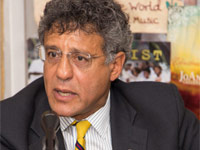WASHINGTON, DC – Royal Bahamas Defence Force Training Officer Senior Lt. Raymond King has completed the Strategy and International Security (SIS) Course at the National Defense University in Washington DC, and intends to design courses that will allow him to transfer the knowledge he has gained to his fellow officers.
The aim of the SIS course was to deepen the participants’ ability to analyse international relations, international security, and strategy, with a particular focus on security issues in Latin America and the Caribbean.
This is the third NDU course that Sr. Lt. King has taken, including courses on Caribbean Defence and Security, and Advanced Policy Making and Analysis. He spoke to the question of the collaboration between the RBDF and the NDU, asserting that the focus of the NDU on policy and strategy is unique among institutions in the region. “A better educated force makes better decisions,” he said.
“When better decisions are made [the force is] more efficient and more effective.” Sr. Lt. King – who is responsible for the training regimen of the Royal Bahamas Defence Force – said he had plans to develop courses for the officers at home based on the information he has acquired through the NDU courses.
With the overarching goal of broadening their understanding of strategic thinking in the context of international security, Sr. Lt. King and his fellow students undertook an in-depth study of international relations and strategy. The next phase of the course – eight weeks of intensive work – is expected to result in papers seeking to apply the theory and levels of analysis to a security issue in Latin America and the Caribbean.
Officer King’s chosen subject matter was the strategic implications of China’s growing influence in Latin America and the Caribbean. He will focus on three countries – Venezuela, Brazil and Barbados – and hopes to have the paper published upon completion.
About The Course
The course is 14 weeks long, with a three-week on-line phase, a three-week resident phase [which Sr. Lt. King has just completed], and an eight-week research phase. The Strategy and International Security course permits students to improve analytical abilities for public policy evaluation by studying the formulation and implementation of strategies by actors in the national and international security environment.
The course is designed to provide an educational opportunity on strategic thinking to civilian and military government officials as well as other professionals from academia, journalism, and non-government organisations directly involved with issues of national security, national defense, governance, and law enforcement.
About The NDU
The National Defense University is the premier centre for Joint Professional Military Education and is under the direction of the Chairman of the Joint Chiefs of Staff. Its mission is to prepare military and civilian leaders from the United States and other countries to evaluate national and international security challenges through multi-disciplinary educational and research programmes, professional exchanges, and outreach.
About the Centre for Hemispheric Defense Studies
The mission of the CHDS is to conduct educational activities for civilians and the military in the Western Hemisphere to foster trust, mutual understanding, regional cooperation and partner capacity. The Centre for Hemispheric Defense Studies provides education, and conducts outreach, research and knowledge-sharing activities on defense and international security policy-making with military and civilian leaders of the Western Hemisphere.
The centre’s aim is also to advance international security policy and defense decision-making processes, foster partnerships and promote effective civil-military relations in democratic societies, and to contribute to a cooperative international security environment and mutual understanding of priority U.S. and regional defense and international security policy issues.
By Khyle Quincy Parker
Embassy of The Bahamas



